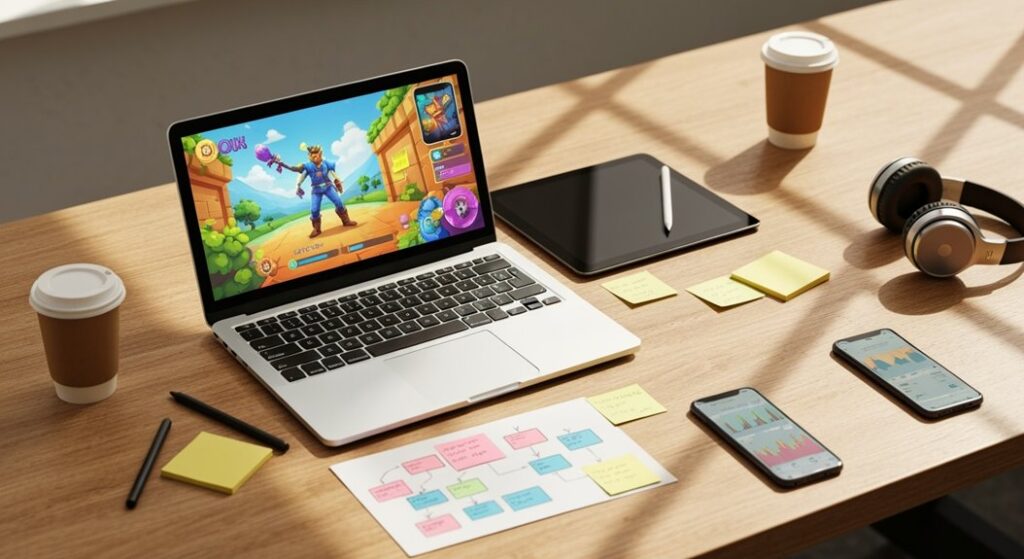
How to fix error Code 403 Roblox?
Unlock the secrets behind Roblox Error Code 403 and discover simple steps to regain access—your gameplay awaits just beyond this guide.
If you’re planning to build a mobile game app, it’s important to focus on more than just eye-catching graphics or impressive sound effects. Creating a successful mobile game app means understanding your audience, knowing what keeps players coming back, and designing gameplay that makes every tap exciting.

With millions of apps available in today’s app ecosystem, your mobile game app needs to stand out with clever engagement strategies, intuitive interfaces, and user-friendly features. By following these essential tips, you can boost your chances of launching a mobile game app that attracts downloads, earns positive reviews, and keeps users entertained for the long haul.
Identifying your target audience is crucial when developing any app, whether it’s a productivity app, entertainment app, or mobile game. Understanding your audience helps you design features, difficulty levels, and rewards that resonate with players.
Ask yourself: Who will use your app? What are their interests? What devices do they typically play on? Consider factors such as age, skill level, gaming preferences, and familiarity with similar apps.
Analyzing trends and studying competitor apps can provide valuable insights about what your audience enjoys. For example, if casual players are your target, focus on easy-to-learn mechanics and quick gaming sessions. If hardcore gamers are your audience, consider complex gameplay with strategic depth and long-term challenges.
By identifying your target audience early, you’ll be able to craft a mobile game app experience that feels personalized and engaging from the start.
Gameplay is the heart of any mobile game. Designing engaging mechanics ensures that players keep coming back.
Successful gameplay balances challenge and reward. Include elements such as power-ups, unlockable levels, boss battles, and progression systems to make the experience feel dynamic and rewarding. Variety is key—mix up levels, environments, and objectives to keep players curious and entertained.
Incorporating social or competitive features like leaderboards, in-app achievements, or cooperative missions can increase engagement. Players enjoy sharing accomplishments with friends or competing against others, making your app more memorable and sticky in the mobile ecosystem.
Remember: even the most beautiful graphics won’t matter if the gameplay isn’t enjoyable. Focus on mechanics that feel intuitive, rewarding, and fun.
A smooth and intuitive user interface (UI) is essential for retaining players. Poor navigation, cluttered menus, or confusing controls can frustrate users and cause them to abandon your app.
Make sure your UI features:
Testing your interface with real users can reveal design flaws early, helping you refine the app experience. User-friendly design not only encourages longer play sessions but also improves your chances of earning positive app reviews, which are crucial for visibility in app stores.
Performance optimization is a key factor in mobile game app success. Users will quickly abandon apps that crash, lag, or consume excessive battery or memory.
Test your app on a variety of devices, from high-end smartphones to budget models, to ensure smooth performance. Optimize by:
A well-optimized app creates a polished and enjoyable experience for all players, enhancing engagement and retention.
Monetization is essential if you want your mobile game app to generate revenue, but it must be implemented thoughtfully. Options include in-app purchases, rewarded ads, and premium content.
Balance monetization so players feel encouraged but not pressured to spend. For example, offer cosmetic items, special abilities, or exclusive levels rather than pay-to-win advantages. Regularly analyze user data to optimize your monetization strategies without disrupting gameplay.
Effective monetization turns your mobile game app into a sustainable business while keeping players satisfied.
User retention is critical for long-term success. Regularly updating your app with new features, levels, challenges, or events keeps players engaged and excited.
Reward loyal users with daily bonuses, achievements, or exclusive items to encourage regular play. Incorporating seasonal events or time-limited challenges can create urgency, motivating users to return frequently.
Strong retention strategies increase lifetime value per player, which enhances revenue opportunities and builds a loyal community around your app.
Testing is crucial to ensure your app performs flawlessly in the competitive mobile ecosystem. Conduct comprehensive testing to catch bugs, crashes, and compatibility issues.
Include beta testers in your process—they can provide feedback on gameplay, UI, and overall user experience. Addressing issues early ensures a polished launch and reduces negative reviews, which can affect your app’s ranking and visibility in app stores.
Remember: testing is not just a technical step—it’s an essential part of understanding how real users interact with your mobile game app.
Creating a successful mobile game app requires careful planning, attention to detail, and a user-centered approach. Prioritize understanding your target audience, designing engaging gameplay, and creating a smooth, intuitive interface.
Optimize performance across devices, implement fair and effective monetization strategies, and focus on retention with updates and rewards. Thoroughly test your app before launch to deliver a polished, enjoyable experience.
By following these essential tips, your mobile game app will not only attract downloads and positive reviews but also foster a loyal community of players who return again and again. With careful planning and attention to user experience, you can craft a mobile game app that stands out in the crowded app ecosystem and keeps players entertained for the long haul.

Unlock the secrets behind Roblox Error Code 403 and discover simple steps to regain access—your gameplay awaits just beyond this guide.

Get step-by-step guidance on how to cancel Roblox Premium easily and avoid unwanted charges; learn what to expect after cancellation.

One game dominates Roblox with millions of daily players, but what makes it so irresistible might surprise you—discover the answer inside.

Stay hidden and play freely on Roblox by mastering simple steps to appear offline—discover how to control your online status effectively.

Find out the diverse devices and platforms where you can play Roblox, unlocking endless gaming adventures across screens you might not expect.

Protecting kids on Roblox involves understanding its safety features and risks—discover what parents need to know before letting children play.